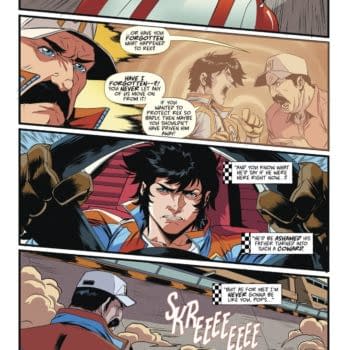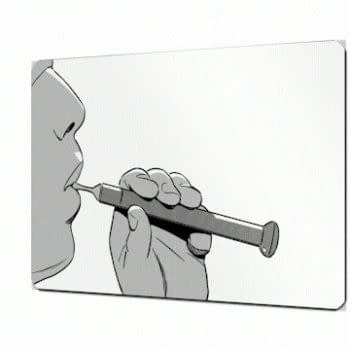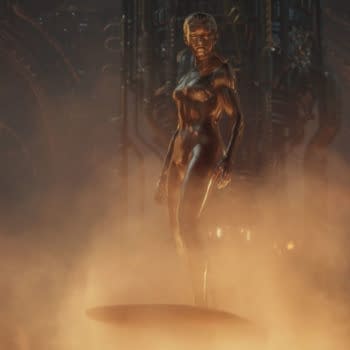Posted in: Comics, san diego comic con | Tagged: Comics, David Brothers, david lapham, Ed Brisson, entertainment, image, kelly sue deconnick, sdcc
SDCC '15: Image Comics – Where Creators Own Reality With David Lapham, Ed Brisson, Kelly Sue De Connick, Sina Grace, and Brandon Montclare(UPDATE)

Brothers immediately began the panel praising Genius from Top Cow, about a young girl—who happens to be a military genius—uniting her neighborhood against the local authorities. "It's very resonant if you follow the news," Brothers said. "Even though it's an action story, it still affects our reality."
He began with DeConnick and how Bitch Planet came about.
"The most fertile soil for fiction for me are things about which I have mixed feelings," she said. They wanted to do a work-for-hire project before deciding they didn't want to wait around for a book to pop up, so they made their own. "What was my end to this?" she asked, and mentioned that she loved women-in-prison films and exploitation films of the '70s.
"I was thinking about how appealing it is to tell a story about women are confined and reduced to our parts in a story that has boxes within boxes, and using that very consciously. We wanted it to be funny, too, because what's funnier than the patriarchy?"
Brisson's book Sheltered came up next.
"Johnnie [Christmas] and I, we share a studio space and we shoot ideas back and forth," he said. When it comes to training kids for a post-apocalyptic world, he thought about how adults shape their kids into who they become. "It's about when you try to do everything right but it all goes wrong."

Brothers shifted to Lapham's Stray Bullets, who was doing mainstream superheroes early in his career and decided to make his own book. He and his wife Maria Lapham started Stray Bullets with one story, and then another, with Lapham finding ways to make them connect later on.
"I used to say our goal was to hurt people with the stories," Lapham joked.
"Sina, you do comics about you," Brothers said.
Grace took DeConnick's microphone, much louder than the others, and spoke about his autobiographical comics like Self-Obsessed. He wanted to make comics that would sell more, and after speaking with Eric Stephenson about what to do, he was advised to pick a project that he can get excited about. "This is the all-or-nothing phase in my life."
Grace said he made some mistakes about speaking for other people when he was in college and is careful about what he says.
Brothers asked why they latch onto certain elements, like DeConnick and prison films.
"The moment when the hero is down and bloody and something in them changes and they get back up and the looking in their eyes something says 'you're a dead man,'" DeConnick said. "That's me, baby! That's my time!"
Brothers encouraged DeConnick to educate the audience about the '70s film, Female Prisoner 701: Scorpion, and she proudly fan'd out all over the crowd.
Montclare spoke about 1986, and that was the time he was in high school and reading comics that blew his mind. "To me it's interesting because it is kind of funny." Montclare said the series would be less interesting if the series was set in the 1990s, an era firmer in his mind.
"It's easier to imagine how great it was because you were a little less aware," Brothers said.
Rocket Girl is rebelling against a future controlled by a corporate conglomerate, a theme that rings throughout the comic.
Lapham spoke about Stray Bullets being a comic about his life, and Brisson said Sheltered's contemporary timeline isn't important to the series. "The thing that's interesting is that anxiety you feel when you know something bad is coming but you don't know when," he said, speaking of the horror of anticipation being worse than actual event when it happens.
Q&A began with a fan asking how the writers create experiences from ones that aren't their own, writing for trans, queer, cis, etc. characters.
"Bitch Planet has a largely black cast and I was terrified of that, rightfully and respectfully so, but I was lucky enough to have an editor on the first issue who is one of the people I respect and admire most in my life," DeConnick said of Danielle Harrison, a feminist scholar and "one of the funniest human beings I've ever met in my life."
Harrison called her on her crap, saying "she basically told me I was being a coward." It's a book about marginalization but she didn't want to talk about race. "And that is some bullshit. We have to talk about race. She constantly has to challenge herself and her thought process to deal with these issues. "As artists, we have to go to these scary places." She said she's not speaking for black women, white women, gay or straight women, trans women, but these specific characters.
"I'm telling their stories," she said.
Grace expanded, saying that he sends his work to people he's representing in his work to "look for blind spots."
He said he doesn't ever want to be in a James Robinson situation, but he wants to put his perspective on it. "You should have a nice group of diverse friends to hit up," he said.
Lapham, Brisson, and Montclare were asked about writing teenage girl characters.
Lapham mentioned his wife's strong influence, "I think she's way cooler than me." Ultimately every character is an individual person, and that informs his writing. "When you read it and it's not singing to you, it's probably bullshit," Lapham said.
DeConnick mentioned her test where you can replace a character in a story with a sexy lamp, "you're probably doing something wrong." Take the character out, does the story still work? No? "Then you blew it," she said.
Brisson mentioned a shooting range incident in Arizona when child shot and killed an instructor and how he relates with his own daughter, and that was the genesis of a bigger story. "Not that that's her, but that's just where the germ of the story came from."
Montclare said he has to be very conscious about writing something that inspires Reeder. "So often I feel like I'm stealing from Frank Miller's Carrie Kelly in the Dark Knight Returns. I know Miller isn't seen as the authority on teenage voices," Montclare joked.
Asked about the difference between Captain Marvel and Bitch Planet and how strong feminism is in each book, and DeConnick said it's a harder push at the Big Two than it is elsewhere to get things changed.
She mentioned sending an email to Image about Bitch Planet, and Stephenson replied in an email that he would very much like to publish that book. Simple as that.
"The answer to 'too little diversity' isn't 'less diversity,'" she said.
Brisson said, "They're big corporate machines that have a lot of gears, but with the Image books, we do what we want."
Next questioner wondered how the creators keep their characters straight between all of the different projects they do.
Lapham mentioned how hard it is when projects don't sell well and they're cut short.
DeConnick said she was bummed out when Avengers Assemble was cancelled and that she just finished Captain Marvel, but she looks at it like she's just taking a break from those characters.
Brothers thanked the cosplayers and encouraged everyone to read the panelists books.










